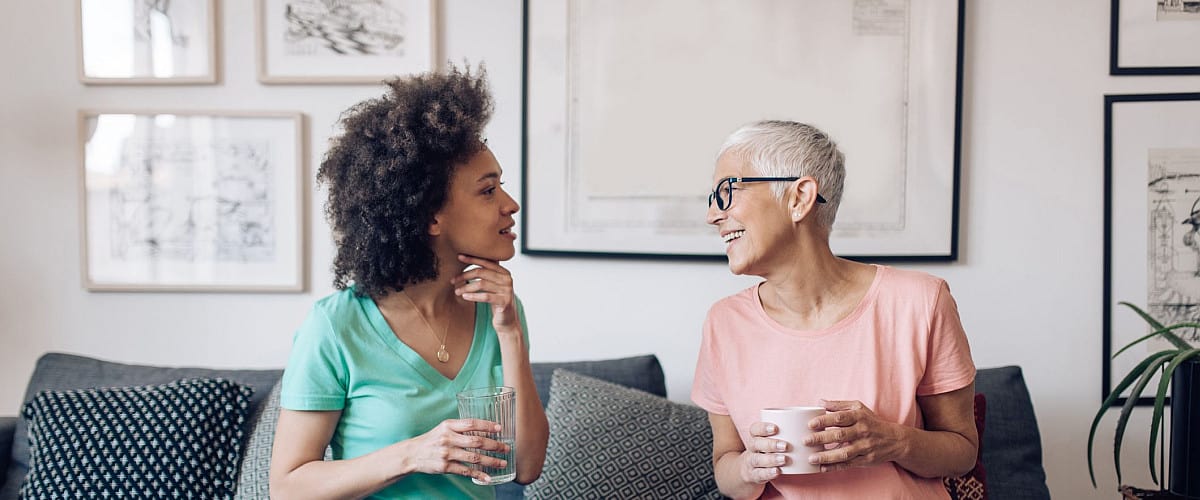To be our healthiest selves, we try to eat right, to exercise, and to manage our stress level as much as possible. Good moves, all. But many of us may be skipping what’s been shown to have just as big an effect on our health: Connecting with each other.
Inherently, we understand the power of connections. Who doesn’t feel better even after the briefest personal contact or positive conversations? But increasingly, science is also proving the deeper importance of social connection. Health researchers report that our connections with family, with friends, with coworkers, with classmates—even with neighbors or baristas whose names we might not even know—play an essential role in what keeps us healthy.
What is it that makes interweaving our lives with each other so important?
The Science of Being Connected
 For starters, the Centers for Disease Control and Prevention tells us that being socially connected positively influences our minds, bodies, and behavior. That leads to better health, improved sleep, enhanced well-being, and even longer life expectancy.
For starters, the Centers for Disease Control and Prevention tells us that being socially connected positively influences our minds, bodies, and behavior. That leads to better health, improved sleep, enhanced well-being, and even longer life expectancy.
Research has shown that those of us with stronger social bonds have a 50 percent increased likelihood of living longer than those who don’t!
As if that’s not enough good news, here’s more. The National Institutes of Health report that people surveyed who had more social connections also had a reduced risk of developing dementia. Additionally, according to the CDC, they have a lessened chance of developing heart disease or having a stroke.
And still more from the CDC: Being socially connected leads to higher levels of empathy and of self-esteem. Connect with others, and you’re more likely to take better care of yourself, eat healthier foods, and better manage your weight than you would if you were isolated.
Further research showcased in Psychology Today showed that social connection strengthens our immune system, which helps us recover from disease faster. And a sense of connection to others tends to reduce rates of anxiety and depression.
The Downside of Isolation
 All of the above is certainly a lot of good news! But, on the other hand, lack of social connection is associated with declines in physical, emotional, and mental health.
All of the above is certainly a lot of good news! But, on the other hand, lack of social connection is associated with declines in physical, emotional, and mental health.
The following statistics about too little social connection are sobering.
Lack of social connection can increase the risk of premature death to the same degree as smoking 15 cigarettes a day (U.S. Surgeon General).
Not having a social network can increase the risk of getting heart disease by 29 percent and the risk of having a stroke by 32 percent (American Heart Association).
Heart failure patients reporting high levels of loneliness had a 68 percent increased risk over those reporting low levels of being hospitalized, a 57 percent higher risk of visits to the emergency room, and a 26 percent higher risk of outpatient visits (U.S. Department of Health and Human Services).
And the trends show that loneliness and isolation have unfortunately been on the rise. The pandemic didn’t help. The U.S. Surgeon General recently declared that we’re experiencing “Our Epidemic of Loneliness and Isolation.”
Take Action
 It’s enough to make you want to call a friend, to say “yes” to a family reunion, or to strike up a conversation with a colleague or stranger.
It’s enough to make you want to call a friend, to say “yes” to a family reunion, or to strike up a conversation with a colleague or stranger.
For some, that comes naturally. For others, it takes more purposeful planning.
What’s important to keep in mind, though, is that we are all different.
“There is no ‘one size fits all’ approach because we have different needs for social connectedness,” says Helen Lavretsky, MD, professor in residence in the Department of Psychiatry at UCLA and member of the American Heart Association’s Psychological Health and Well-Being Science Committee.
If you’re comfortable having one close friend compared to your sister who has dozens of people she could call right now to talk to, that’s fine. It’s a matter of having what Dr. Lavretsky calls “purposeful connectivity and shared goals and purposes to enhance the depth of connection.”
Many people find that within their families, Dr. Lavretsky says. But many don’t—and that’s OK, too.
“Instead, you can seek a ‘chosen family’ of like-minded individuals who could be friends, colleagues, or advisors,” she says.
6 Ways to Build Connection
 Here are some suggestions on becoming more connected, whether with one person or a dozen:
Here are some suggestions on becoming more connected, whether with one person or a dozen:
Join an interest club. You could become part of a yoga community or a singing or dancing group, Dr. Lavretsky says.
Sign up for something new. Have you always wanted to learn French? To hone your painting or pickleball skills? Sign up for a class or a league! You’ll be around people with shared interests—and just may continue friendships long after classes come to an end.
Schedule an 8-minute phone call. This suggestion was part of the 7-Day Happiness Challenge in the Well section of The New York Times. Reach out to someone you haven’t talked to in a while and propose an eight-minute phone call. The editor who tried it reported humming a little after talking to her friend she hadn’t talked to in way too long. “Our connection was brief,” she reported, “but it was real.”
Volunteer. There’s something about being needed, about having someone count on you, that brightens not only the day of whoever you’re helping, but—surprise—brightens yours, as well.
Talk to strangers. Shhh! Don’t tell your mother, who probably warned you throughout childhood to avoid doing this. But try taking a moment to comment on the coffee barista’s smile or the ability of a bookstore owner to recommend the just-right book. Doing so can create a connection that will linger long after you’ve sipped your final sip or finished the book.
Walk your neighborhood. Wave to people. Stop to say “hello” or ask their pet’s name. Keep in mind that you’re not the only one whose health, life, and outlook could benefit from social interaction. Everyone benefits!
Note: Since everyone’s health history and nutritional needs are so different, please make sure that you talk with your doctor and a registered dietitian to get advice about the diet and exercise plan that‘s right for you.

